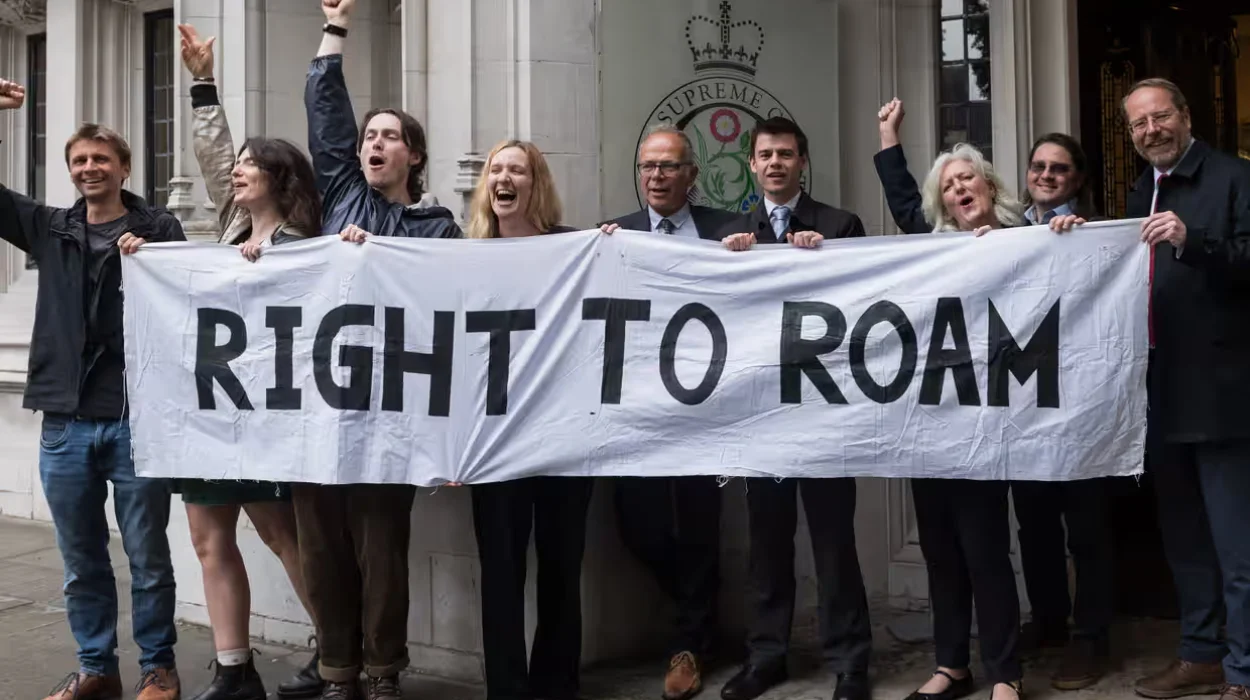UK (Parliament Politics Magazine) – Labour MPs call for a broader right to roam in England after the Supreme Court ruling upheld wild camping rights on Dartmoor without landowner consent.
As reported by The Guardian, following the Supreme Court confirming the legality of wild camping on Dartmoor, Labour MPs are calling on the government to reinstate wider public access rights in England.
Judges ruled this week that camping in the national park remains legal after a wealthy hedge fund owner attempted to block access to his estate and restrict public rights throughout the park.
Only 8% of England is legally accessible to roam freely, while the remainder requires landowner approval. Wild camping is legally allowed only on Dartmoor in England, unlike Scotland, which established right-to-roam laws in 2003.
Labour initially pledged to launch a Scottish-style right to roam, giving the English public the freedom to explore rural areas, but later reversed the plan following pressure from rural interest groups.
What did Phil Brickell say about opening up England’s countryside for all?
The Labour MP for Bolton West, Phil Brickell, stated,
“The barriers preventing millions of people from enjoying and caring for our countryside are a legacy of a bygone era and urgently need replacing.”
He added,
“It’s time to resolve the issues of access to the English countryside once and for all. That must mean legislating for a widespread right to roam covering land and water, which removes access islands, allows responsible wild camping in national parks and increases connectivity to nature for everyone, regardless of where you live.”
What did Andy MacNae say about expanding outdoor access and recreation?
Andy MacNae, the Labour MP for Rossendale and Darwen, said,
“It’s a relief that the Supreme Court has recognised the range of activities that make up outdoor recreation. The government now have the opportunity to build on this, not only expanding our right to access nature but also the activities we can enjoy when in it, such as kayaking, climbing or wild camping.”
She added,
“At the heart of this must be an effort to expand access to the widest possible group of people. Nature should be there in our cities, towns and new housing developments so that anyone can access green or blue spaces within 15 minutes.”
What did Steve Reed and Alex Sobel say about expanding countryside access?
Environment Secretary Steve Reed rejected the proposal, stating,
“Our intention is to increase access to the countryside, but in a responsible way, not as a free-for-all.”
Referring to the ruling, Alex Sobel, the MP for Leeds Central,
“We need to make this the start of a much wider access to nature than people currently enjoy.”
What did Caroline Voaden say about extending wild camping rights beyond Dartmoor?
The Liberal Democrats advocate for expanded access rights across England’s countryside, beginning with a nationwide legal right to wild camp.
Caroline Voaden, the Lib Dem MP for South Devon, stated,
“I hope we can begin work to extend our right to wild camp beyond Dartmoor. In opposition, Labour spoke about extending the right to wild camp across the UK. I hope they will put those words into action and expand access rights for walkers and campers across the country.”
What did Mary Creagh say about the Dartmoor wild camping ruling?
The nature minister Mary Creagh stated,
“Wild camping under the stars is one of life’s great pleasures, so I welcome today’s ruling which upholds that right on Dartmoor’s common land. This government is passionate about bringing people closer to nature by creating nine national river walks and three new national forests.”
How will government policy affect access to England’s green spaces?
Concerns are growing that government policies may limit public access to green spaces across England. According to The Guardian, developers could build on protected green areas without the need to replace lost natural habitats nearby.
Housing developments will lead to the removal of green spaces, which will be compensated by new nature areas and parks. However, the new planning bill allows these replacements to be located outside the county where the green space was lost.
Key points of the Planning and Infrastructure Bill
- Streamline Nationally Significant Infrastructure Projects (NSIPs) – Faster approvals, reduced judicial reviews, updated National Policy Statements.
- Electricity grid reforms – Prioritize “first ready, first connected” projects, introduce bill discounts for communities near transmission lines.
- Transport & highways – Simplify consenting for roads, railways, and EV chargepoints.
- Local planning fee flexibility – Allow councils to set fees to cover costs.
- Planning committee reforms – Mandatory training, clearer delegation rules.
- Spatial Development Strategies – Require strategic planning across regions for housing and infrastructure.
- Nature Restoration Fund – Developers pay into strategic environmental plans instead of project-specific mitigation.
- Ensures better environmental outcomes while speeding up housing delivery.
- Strengthen powers to deliver large-scale housing and infrastructure.
- Improve coordination with transport authorities.
- Faster land assembly for housing and infrastructure.
- Limit excessive compensation (e.g., “hope value”) for public projects.


